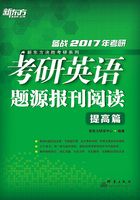
Text 4
Millions of school-leavers are about to start a new life at university. Some are inspired by a pure love of learning. But most also believe that spending three or four years at university—and accumulating huge debts in the process—will boost their chances of landing a well-paid and secure job.
Their elders have always told them that education is the best way to equip themselves to thrive in a globalised world. Blue-collar workers will see their jobs offshored and automated, the familiar argument goes. But the graduate elite will have the world at its feet. There is some evidence to support this view. Educational qualifications are tightly correlated with earnings.
But is the past a reliable guide to the future? Or are we at the beginning of a new phase in the relationship between jobs and education? There are good reasons for thinking that old patterns are about to change—and that the current recession-driven downturn in the demand for Western graduates will turn into something structural. The gale of creative destruction that has shaken so many blue-collar workers over the past few decades is beginning to shake the cognitive elite as well.
The supply of university graduates is increasing rapidly. At the same time, the demand for educated labor is being reconfigured by technology, in much the same way that the demand for agricultural labor was reconfigured in the 19th century and that for factory labor in the 20th. Computers can not only perform repetitive mental tasks much faster than human beings. They can also empower amateurs to do what professionals once did: why hire a flesh-and-blood accountant to complete your tax return when a software will do the job at a fraction of the cost? And the variety of jobs that computers can do is multiplying as programmers teach them to deal with tone and linguistic ambiguity.
Several economists have begun to argue that post-industrial societies will be characterized not by a relentless rise in demand for the educated but by a great "hollowing out", as mid-level jobs are destroyed by smart machines and high-level job growth slows. David Autor, of the Massachusetts Institute of Technology (MIT) points out that the main effect of automation in the computer era is not that it destroys blue-collar jobs but that it destroys any job that can be reduced to a routine. A plumber or lorry-driver's job cannot be outsourced to India. A computer programmer's can.
Thomas Malone of MIT argues that automation may be part of a bigger change: the application of the division of labor to brain-work. This change will undoubtedly improve the productivity of brain-workers. It will also allow consumers to avoid the professional companies that have extracted high rents for their services. But the reconfiguration of brain-work will also make life far less cosy and predictable for the next generation of graduates.
16. It can be inferred from Paragraphs 1 and 2 that______.
[A] it's believed that college education ensures a bright future
[B] universities should not make students in debts
[C] uneducated people will lead an unhappy life
[D] educational background decides everybody's salary
17. The demand for well-educated labor______.
[A] is about to go through an essential change
[B] will influence the demand for blue-collar workers
[C] is affected by agricultural and industrial development
[D] has increased rapidly due to the extensive use of computers
18. The phrase "hollowing out" (Line 2, Para. 5) most probably means______.
[A] emptiness
[B] decline
[C] migration
[D] shortage
19. David Autor thinks that automation in the computer era______.
[A] has no influence on blue-collar workers
[B] can relieve people from complicated work
[C] causes unemployment problems for the educated
[D] reduces all the work to a routine
20. Which of the following would be the best title for the text?
[A] A False Expectation of College Education
[B] Changes in the Demand for Workers
[C] Replacement of Brainworkers by Computers
[D] Worries about the Educated Labor